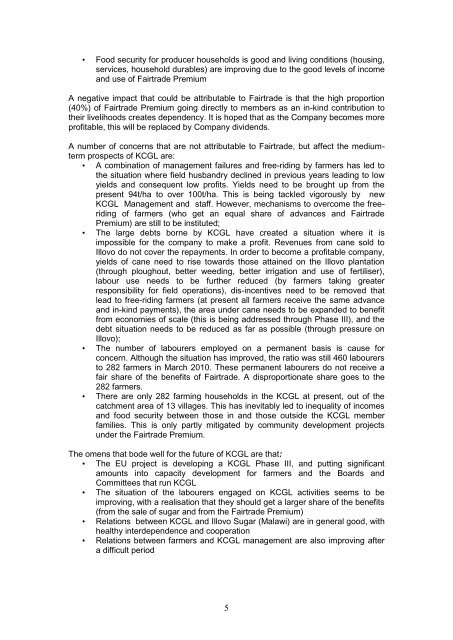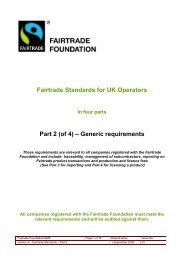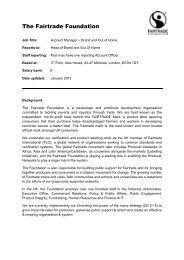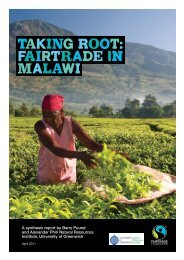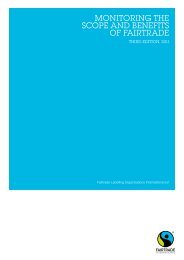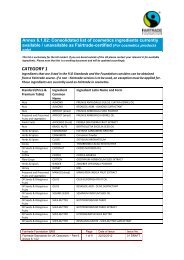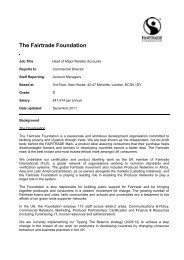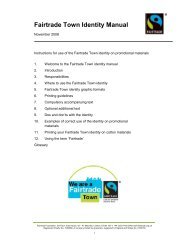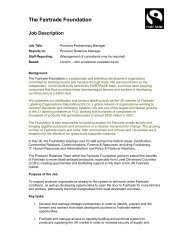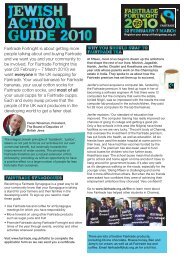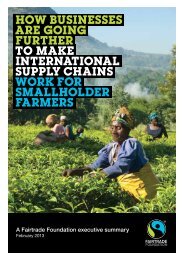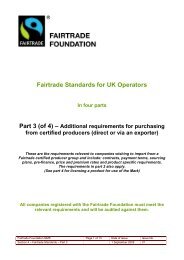longitudinal impact assessment study of sugar producers in malawi
longitudinal impact assessment study of sugar producers in malawi
longitudinal impact assessment study of sugar producers in malawi
You also want an ePaper? Increase the reach of your titles
YUMPU automatically turns print PDFs into web optimized ePapers that Google loves.
• Food security for producer households is good and liv<strong>in</strong>g conditions (hous<strong>in</strong>g,<br />
services, household durables) are improv<strong>in</strong>g due to the good levels <strong>of</strong> <strong>in</strong>come<br />
and use <strong>of</strong> Fairtrade Premium<br />
A negative <strong>impact</strong> that could be attributable to Fairtrade is that the high proportion<br />
(40%) <strong>of</strong> Fairtrade Premium go<strong>in</strong>g directly to members as an <strong>in</strong>-k<strong>in</strong>d contribution to<br />
their livelihoods creates dependency. It is hoped that as the Company becomes more<br />
pr<strong>of</strong>itable, this will be replaced by Company dividends.<br />
A number <strong>of</strong> concerns that are not attributable to Fairtrade, but affect the mediumterm<br />
prospects <strong>of</strong> KCGL are:<br />
• A comb<strong>in</strong>ation <strong>of</strong> management failures and free-rid<strong>in</strong>g by farmers has led to<br />
the situation where field husbandry decl<strong>in</strong>ed <strong>in</strong> previous years lead<strong>in</strong>g to low<br />
yields and consequent low pr<strong>of</strong>its. Yields need to be brought up from the<br />
present 94t/ha to over 100t/ha. This is be<strong>in</strong>g tackled vigorously by new<br />
KCGL Management and staff. However, mechanisms to overcome the freerid<strong>in</strong>g<br />
<strong>of</strong> farmers (who get an equal share <strong>of</strong> advances and Fairtrade<br />
Premium) are still to be <strong>in</strong>stituted;<br />
• The large debts borne by KCGL have created a situation where it is<br />
impossible for the company to make a pr<strong>of</strong>it. Revenues from cane sold to<br />
Illovo do not cover the repayments. In order to become a pr<strong>of</strong>itable company,<br />
yields <strong>of</strong> cane need to rise towards those atta<strong>in</strong>ed on the Illovo plantation<br />
(through ploughout, better weed<strong>in</strong>g, better irrigation and use <strong>of</strong> fertiliser),<br />
labour use needs to be further reduced (by farmers tak<strong>in</strong>g greater<br />
responsibility for field operations), dis-<strong>in</strong>centives need to be removed that<br />
lead to free-rid<strong>in</strong>g farmers (at present all farmers receive the same advance<br />
and <strong>in</strong>-k<strong>in</strong>d payments), the area under cane needs to be expanded to benefit<br />
from economies <strong>of</strong> scale (this is be<strong>in</strong>g addressed through Phase III), and the<br />
debt situation needs to be reduced as far as possible (through pressure on<br />
Illovo);<br />
• The number <strong>of</strong> labourers employed on a permanent basis is cause for<br />
concern. Although the situation has improved, the ratio was still 460 labourers<br />
to 282 farmers <strong>in</strong> March 2010. These permanent labourers do not receive a<br />
fair share <strong>of</strong> the benefits <strong>of</strong> Fairtrade. A disproportionate share goes to the<br />
282 farmers.<br />
• There are only 282 farm<strong>in</strong>g households <strong>in</strong> the KCGL at present, out <strong>of</strong> the<br />
catchment area <strong>of</strong> 13 villages. This has <strong>in</strong>evitably led to <strong>in</strong>equality <strong>of</strong> <strong>in</strong>comes<br />
and food security between those <strong>in</strong> and those outside the KCGL member<br />
families. This is only partly mitigated by community development projects<br />
under the Fairtrade Premium.<br />
The omens that bode well for the future <strong>of</strong> KCGL are that:<br />
• The EU project is develop<strong>in</strong>g a KCGL Phase III, and putt<strong>in</strong>g significant<br />
amounts <strong>in</strong>to capacity development for farmers and the Boards and<br />
Committees that run KCGL<br />
• The situation <strong>of</strong> the labourers engaged on KCGL activities seems to be<br />
improv<strong>in</strong>g, with a realisation that they should get a larger share <strong>of</strong> the benefits<br />
(from the sale <strong>of</strong> <strong>sugar</strong> and from the Fairtrade Premium)<br />
• Relations between KCGL and Illovo Sugar (Malawi) are <strong>in</strong> general good, with<br />
healthy <strong>in</strong>terdependence and cooperation<br />
• Relations between farmers and KCGL management are also improv<strong>in</strong>g after<br />
a difficult period<br />
5


